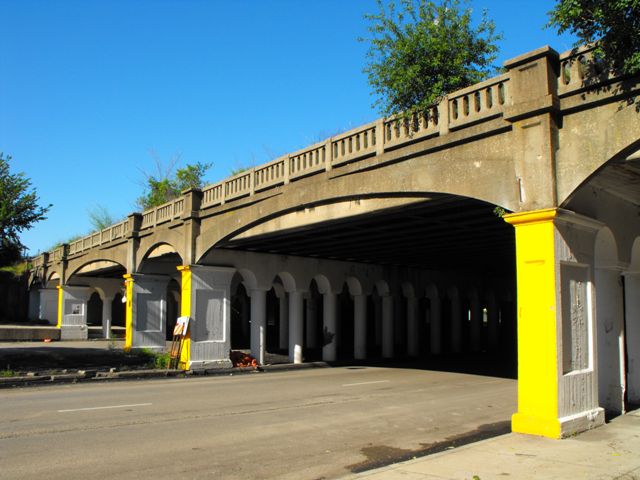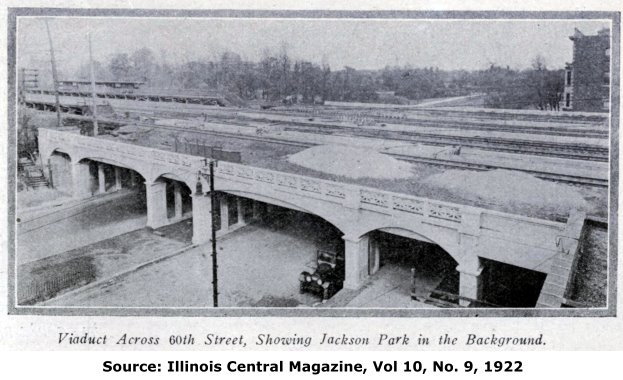We Recommend:
Bach Steel - Experts at historic truss bridge restoration.
BridgeHunter.com Phase 1 is released to the public! - Visit Now
60th Street Bridge

Primary Photographer(s): Nathan Holth
Bridge Documented: July 22, 2010 and September 11, 2012
Railroad (Metra Electric District, NICTD South Shore Line, Former Illinois Central) Over 60th Street and Eastbound Midway Plaisance Drive
Chicago: Cook County, Illinois: United States
By Builder/Contractor: Unknown
Not Available or Not Applicable
Not Available
Not Available
Not Available
6 Main Span(s)
Not Applicable

View Information About HSR Ratings
Bridge Documentation
Overview of Historic Bridges Along This Section of Railroad
Originally an Illinois Central Railroad line, the large set of railroad tracks that run along the lakeshore north to Millennium Station in downtown Chicago are today served by Metra and Southshore commuter trains. Along the section of this railroad line that runs through the Hyde Park and Kenwood areas of Chicago, there are a number of old railroad over highway overpass bridges that were built with an unusually large amount of attention paid to the architectural detailing and beauty of the bridges. These bridges remain today with these details intact and largely unaltered from their original design. Some of the bridges contain what appears to be a simple reinforced concrete slab superstructures. Others contain steel superstructures, but on most of these bridges, the outside face of the outermost beams are encased in concrete for aesthetic purposes. The bridges also contain decorative concrete railings. The spans of the bridges are supported by concrete column bents (piers) that are also constructed with a number of architectural and aesthetically pleasing details. The final composition is intended to make the bridges look consistent, and give the appearance of an all-concrete bridge, when in fact the superstructure may be either steel or concrete. Among this group of historic bridges there are several different styles. The superstructure designs are all essentially the same, but the railroad appears to have employed several different designs for the aesthetic treatment of the bridges. Some of the bridges were constructed with train stations whose entrances are integrated into the abutments.
These bridges are all historically noteworthy in Chicago because they are examples of railroad over highway overpass bridges that were clearly designed with aesthetic treatment being a key part of the bridge. There are hundreds of old railroad over highway overpass bridges in Chicago, but many of them are largely utilitarian in design. By today's standards these bridges might be visually attractive, containing rivets and built-up beams with lattice or v-lacing, etc, but during the time that those bridges were built such elements would have been considered utilitarian construction, not aesthetic treatment. In contrast, these bridges on this section of the the former Illinois Central line clearly were designed to be beautiful, even though the superstructure type itself is a simple and mundane type.
These historic bridges do not currently appear to be at risk for demolition. While some of them show signs of deterioration, others were being repaired at the time of documentation, so it seems likely that those which are deteriorated might be repaired in the future. This is great to see, since these attractive bridges contribute positively to the surrounding area.
Details About The 60th Street Bridge
The bridge is composed of a combination of longer/main spans which are steel stringer spans composed of riveted built-up beams, and also shorter/approach spans which are concrete slab spans. This bridge is an example of a design that includes a graceful series of shallow arch patterns that cover up the mundane superstructures of the bridge. Of the examples of this design, this is the longest example along with its near-twin to the North at 59th Street on the other side of Midway Plaisance. With these two bridges, on the shorter/approach spans, these arch designs are simply cast into the concrete slab superstructure. On the main/longer spans, concrete was applied to the outside of the outermost stringer to cover up the riveted built-up steel stringers of the bridge superstructure, while allowing for a consistent continuation of the pattern of inset rectangles.
The bridge crosses both 60th Street and Midway Plaisance Drive. 60th Street is just south of and parallels Midway Plaisance Drive. The six span bridge has two large spans, one for 60th Street and the other for eastbound Midway Plaisance Drive. These spans have a single short span between each other at the center of the bridge which spans a median of sorts. The north end of the bridge has a single short span over the sidewalk, while the south end of the bridge has two spans over the sidewalk.
There appear to have been on-going repairs to the columns of the concrete column bents. These repairs appear to be respectful of the historic integrity of the bridge, and did not appear to be altering the aesthetic qualities of the arched caps.
![]()
Photo Galleries and Videos: 60th Street Bridge
Bridge Photo-Documentation
Original / Full Size PhotosA collection of overview and detail photos. This gallery offers photos in the highest available resolution and file size in a touch-friendly popup viewer.
Alternatively, Browse Without Using Viewer
![]()
Bridge Photo-Documentation
Mobile Optimized PhotosA collection of overview and detail photos. This gallery features data-friendly, fast-loading photos in a touch-friendly popup viewer.
Alternatively, Browse Without Using Viewer
![]()
Maps and Links: 60th Street Bridge
Coordinates (Latitude, Longitude):
Search For Additional Bridge Listings:
Bridgehunter.com: View listed bridges within 0.5 miles (0.8 kilometers) of this bridge.
Bridgehunter.com: View listed bridges within 10 miles (16 kilometers) of this bridge.
Additional Maps:
Google Streetview (If Available)
GeoHack (Additional Links and Coordinates)
Apple Maps (Via DuckDuckGo Search)
Apple Maps (Apple devices only)
Android: Open Location In Your Map or GPS App
Flickr Gallery (Find Nearby Photos)
Wikimedia Commons (Find Nearby Photos)
Directions Via Sygic For Android
Directions Via Sygic For iOS and Android Dolphin Browser
USGS National Map (United States Only)
Historical USGS Topo Maps (United States Only)
Historic Aerials (United States Only)
CalTopo Maps (United States Only)


